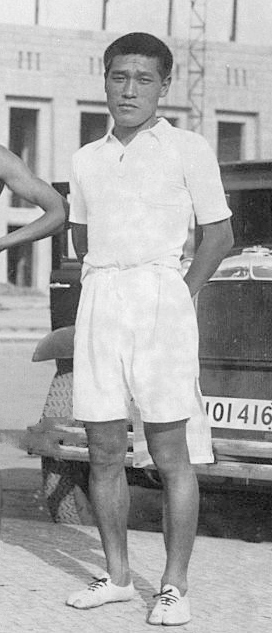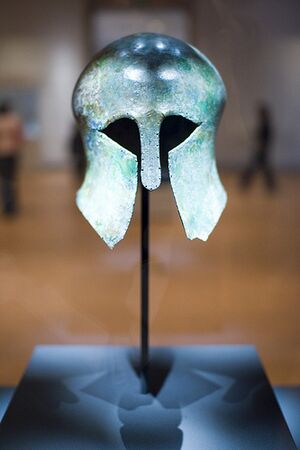Sohn Kee-chung facts for kids

Sohn Kee-chung (1936).
|
|||||||||||
| Personal information | |||||||||||
|---|---|---|---|---|---|---|---|---|---|---|---|
| Native name | 孫基禎 > 손기정 | ||||||||||
| Nationality | |||||||||||
| Born | August 29, 1912 Yeng Byen City, Heian-hokudō, Korea under Japanese rule (current-day Sinuiju, North Korea) |
||||||||||
| Died | November 15, 2002 (aged 90) Seoul, South Korea |
||||||||||
| Height | 1.70 m (5 ft 7 in) | ||||||||||
| Weight | 60 kg (132 lb) | ||||||||||
| Korean name | |||||||||||
| Hangul | |||||||||||
| Hanja | |||||||||||
| Revised Romanization | Son Gijeong | ||||||||||
| McCune–Reischauer | Son Kijŏng | ||||||||||
| Sport | |||||||||||
| Sport | Athletics | ||||||||||
| Now coaching | Ham Kee-Yong, Suh Yun-Bok | ||||||||||
| Achievements and titles | |||||||||||
| Olympic finals |
|
||||||||||
|
Medal record
|
|||||||||||
Sohn Kee-chung (Korean: 손기정, Sohn Kee-chung; August 29, 1912 – November 15, 2002) was a famous Olympic athlete. He was a long-distance runner. He made history by becoming the first person of Korean background to win a medal at the Olympic Games. He won a gold medal in the marathon at the 1936 Berlin Olympics. Sohn was born in Korea. However, he had to compete for Japan. This was because Korea was under Japanese rule at that time. Sohn set a new Olympic record with his winning time.
Sohn had to use the Japanese name Kitei Son when he competed. This was because Korea was controlled by the Japanese Empire during his running career.
Contents
Early Life and Training
Sohn Kee-chung was born in what is now Sinuiju, North P'yŏngan Province. This area is in present-day North Korea. At the time, Japan ruled Korea. He went to Yangchung High School in Seoul. Later, he studied at Meiji University in Tokyo, Japan. He finished his studies there in 1940.
A Champion Runner
Sohn first competed in shorter races, like the 1,500 and 5,000 meters. But he soon switched to longer distances. This happened after he won an eight-mile race in October 1933. Between 1933 and 1936, he ran 12 marathons. He always finished in the top three. He even won nine of these races!
On November 3, 1935, in Tokyo, Japan, Sohn set a new world record for the marathon. His time was 2 hours, 26 minutes, and 42 seconds. This broke the previous record. The International Association of Athletics Federations (IAAF) officially recognized this record. It remained unbroken until 1947. That's when Sohn's own student, Suh Yun-Bok, won the Boston Marathon.
The Berlin Olympics Victory
Sohn competed for the Empire of Japan at the 1936 Summer Olympics. He won the gold medal in the marathon event. He completed the 42.195 kilometres (26.219 mi) course in 2 hours, 29 minutes, and 19.2 seconds. This was a new Olympic record. His teammate, Nam Sung-yong, also won a bronze medal.
Because Korea was under Japanese rule then, the International Olympic Committee (IOC) officially gave Japan credit for Sohn's gold and Nam's bronze medals.
On December 9, 2011, the IOC officially recognized Sohn's Korean nationality. They noted how he tried to sign his Korean name. They also saw how he emphasized Korea was a separate nation in interviews. This change came after many requests from the Korean Olympic Committee. However, the IOC decided not to change the official records of his nationality and name from the 1936 Olympics. This was to avoid changing historical facts.
Standing Up for His Homeland
Sohn Kee-chung was ordered by officials from Tokyo to use the Japanese name Son Kitei. This was the Japanese way of saying his Korean name.
Sohn showed his feelings during the award ceremony. He refused to acknowledge the Japanese anthem. He later told reporters he felt ashamed to run for Japan. When a newspaper called Dong-a Ilbo published a photo of Sohn at the medal ceremony, they changed it. They removed the Japanese flag from his running shirt. This action made the Japanese Governor-General of Korea, Minami Jiro, very angry. The Kempetai military police arrested eight people from the newspaper. The newspaper was also stopped from publishing for nine months.
The Ancient Helmet Prize
For winning the marathon, Sohn was supposed to receive a special prize. It was an ancient Corinthian helmet from the 8th century BC. This helmet was found in Olympia, Greece. A newspaper in Athens bought it to give as an Olympic award. However, the IOC felt that giving such a valuable gift would break their rules for amateur athletes. So, the helmet was put in a Berlin museum. It stayed there for 50 years.
Finally, in 1986, the helmet was given to Sohn. Sohn then donated this special helmet to the National Museum of Korea. It was named the 904th National Treasure of South Korea. It is the only Western item with this honor. There was a plan to give copies of this helmet to the winners of the 2006 Sohn Kee-chung marathon. But in the end, they only got to wear a replica.
Later Life and Legacy
After his running career, Sohn Kee-chung became a coach in South Korea. He coached many famous runners. These included Suh Yun-Bok, who won the Boston Marathon in 1947. He also coached Ham Kee-Yong, who won the Boston Marathon in 1950. Another famous runner he coached was Hwang Young-Cho. Hwang won the gold medal in the marathon at the 1992 Summer Olympics. Sohn even traveled to Barcelona to watch Hwang win!
Sohn also became the Vice Chairman of the Korean Sport & Olympic Committee. At the 1988 Summer Olympics in Seoul, he had a great honor. He carried the Olympic torch into the stadium during the opening ceremony.
Sohn wrote a book about his life called My Motherland and Marathon (나의조국과 마라톤). He also received a high award from the South Korean government, the Moran Class of the Korean Order of Civil Merit.
Death and Remembrance
Sohn Kee-chung passed away on November 15, 2002, at the age of 90. He died from pneumonia. He was buried at the Daejeon National Cemetery. To honor him, the Sohn Kee-chung Memorial Park was created in Seoul. He also received another high award after his death, the Grand Cordon (Blue Dragon) of the Order of Sport Merit.
See also
 In Spanish: Sohn Kee-chung para niños
In Spanish: Sohn Kee-chung para niños
 | Frances Mary Albrier |
 | Whitney Young |
 | Muhammad Ali |


